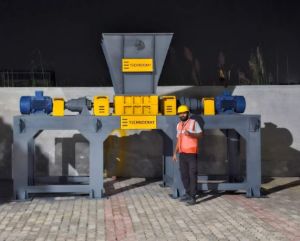
Double Shaft Automatic Metal Shredder Machine
2,000,000 Per Piece
1 Piece (MOQ)
Shredding is a fundamental process in metal recycling, playing a crucial role in transforming scrap metal into valuable raw materials that can be reused in various industries. The metal recycling process involves collecting, sorting, shredding, and melting down scrap metals to produce new metal products. Shredding is a key step that facilitates efficient recycling and contributes to environmental sustainability.Key Roles of Shredding in Metal Recycling: Volume Reduction: Shredding reduces the size and volume of large metal objects, such as cars, appliances, and industrial scrap, making them easier to handle, transport, and process. This volume reduction is essential for optimizing storage and transportation, as well as for improving the efficiency of the recycling process. Material Liberation and Separation: Shredding breaks down complex metal items into smaller pieces, liberating different types of metals and materials from one another. For instance, in the case of cars or electronics, shredding helps separate metals like steel, aluminum, and copper from plastics, rubber, and other non-metal components, facilitating their recovery and recycling. Preparation for Melting: Shredded metal has a larger surface area relative to its volume, which enhances the melting process in furnaces. The smaller, uniform pieces melt more quickly and evenly, leading to more efficient smelting and refining processes, and reducing energy consumption during recycling. Improvement in Sorting Efficiency: After shredding, metal fragments can be more easily sorted using various methods, such as magnetic separation, eddy currents, or air classification. These techniques allow for the efficient separation of ferrous and non-ferrous metals, as well as the removal of non-metallic contaminants, ensuring a higher purity of recycled metal. Enhanced Recycling Rates: Shredding contributes to higher recycling rates by making it possible to recover more metal from complex products and mixed scrap. By effectively breaking down and sorting metal-containing products, shredding maximizes the amount of metal that can be reclaimed and reintroduced into the manufacturing process. Reduction of Environmental Impact: Recycling metal through shredding reduces the need for mining and processing new raw materials, leading to significant energy savings and a lower carbon footprint. It also minimizes the environmental impact of metal waste, which might otherwise end up in landfills, contributing to pollution and resource depletion. Economic Benefits: Shredded metal is a valuable commodity in the recycling market. The process of shredding and recycling metal generates economic value by creating raw materials for new products, reducing the costs associated with raw material extraction, and supporting the circular economy. Compliance with Environmental Regulations: Shredding metal waste helps companies comply with environmental regulations by ensuring that scrap metal is processed in an environmentally responsible manner. Proper shredding and recycling reduce the environmental liabilities associated with metal waste disposal and promote sustainable practices. In summary, shredding is an essential process in metal recycling, enabling efficient size reduction, material liberation, and preparation for melting. It enhances recycling rates, reduces environmental impact, and supports the circular economy by turning scrap metal into valuable resources for new products.